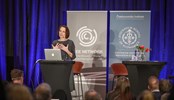Olofsgård, Anders
Stockholm Institute of Transition Economics
Mistra Center for Sustainable Markets
I am a Deputy Director at the Stockholm Institute of Transition Economics (SITE), and Associate Professor at the Stockholm School of Economics. I am also an Affiliated Professor at the Edmund A. Walsh School of Foreign Service and McDonough School of Business at Georgetown University. I earned my Ph. D. in economics from the Institute for International Economic Studies at Stockholm University in 2001.
My primary research areas are political economy and development and I have published widely in the fields of economics, political science and development studies, including in journals such as the Journal of the European Economic Association, Economic Journal, Journal of Public Economics, American Political Science Review, Quarterly Journal of Political Science, and World Development.
I am a regular commentator in Swedish media, primarily in the areas of the political economy of Eastern Europe, including Ukraine, and foreign aid policy, and have been a visiting scholar or written reports for among others the IMF, the World Bank, USAID and the Swedish government.
To see my academic papers and policy work, please see my personal webpage:




